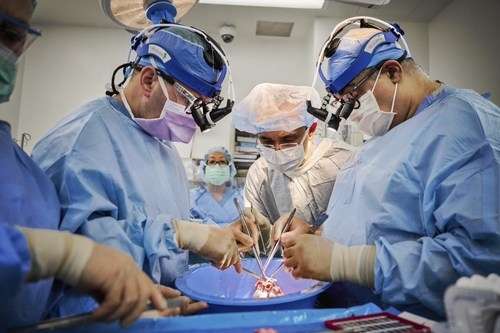The transplant surgeries known as xenotransplants, were performed over several hours on June 16 and July 6 at NYU Langone’s Tisch Hospital and heart function was monitored for three days.
New York: A team of US researchers successfully transplanted two genetically engineered pig hearts into recently deceased humans in June and July, according to an IANS report in The Tribune, Chandigarh.
The surgeries, known as xenotransplants, were performed on June 16 and July 6 at NYU Langone’s Tisch Hospital. These marked the latest advances toward addressing the organ shortage and developing a clinical protocol that would provide an alternative supply of organs for people with life-threatening heart disease.
The transplant surgeries were performed over several hours and heart function was monitored for three days.
No signs of early rejection were observed in either organ and the hearts functioned normally with standard post-transplant medications and without additional mechanical support.
Using a new infectious disease protocol, no presence of porcine cytomegalovirus (pCMV) was detected in either case, the team said.
“Our goal is to integrate the practices used in a typical, everyday heart transplant, only with a non-human organ that will function normally without additional aid from untested devices or medicines,” said Nader Moazami, surgical director of heart transplantation at the NYU Langone.
“We seek to confirm that clinical trials can move ahead using this new supply of organs with the tried-and-true transplant practices we have perfected at the NYU Langone Transplant Institute,” Moazami added.
The hearts were procured from pigs that had 10 genetic modifications, including 4 porcine gene “knockouts” to prevent rejection and abnormal organ growth as well as 6 human transgenes (“knock-ins”) to promote expression of proteins that regulate important biologic pathways that can be disrupted by incompatibilities between pigs and humans.
Meanwhile, the US Food and Drug Administration (FDA) is also considering approving human clinical trials for pig-to-human organ transplants.
******************************************************
Readers
These are extraordinary times. All of us have to rely on high-impact, trustworthy journalism. And this is especially true of the Indian Diaspora. Members of the Indian community overseas cannot be fed with inaccurate news.
Pravasi Samwad is a venture that has no shareholders. It is the result of an impassioned initiative of a handful of Indian journalists spread around the world. We have taken the small step forward with the pledge to provide news with accuracy, free from political and commercial influence. Our aim is to keep you, our readers, informed about developments at ‘home’ and across the world that affect you.
Please help us to keep our journalism independent and free.
In these difficult times, to run a news website requires finances. While every contribution, big or small, will makes a difference, we request our readers to put us in touch with advertisers worldwide. It will be a great help.
For more information: pravasisamwad00@gmail.com











